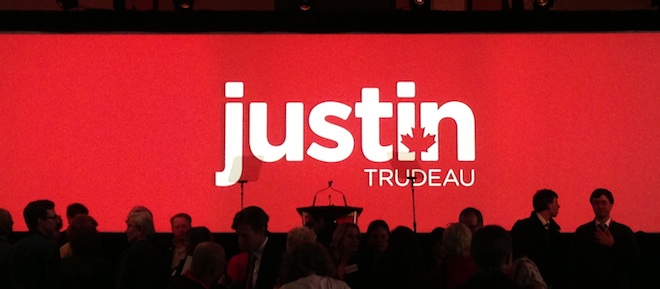Justin Trudeau: Where to now?
John Geddes on three key themes in the Liberal Party leader’s acceptance speech
Share

If you were listening for hints of policy in Justin Trudeau’s acceptance speech in Ottawa as he won the Liberal leadership today, then you must not have been paying attention to his campaign.
Still, there was content of a sort. Three strategic aims, all well worth keeping in mind, stood out in Trudeau’s generally low-key text. He framed Liberalism as the sunny alternative to gloomy Conservatism; asked Quebecers to think of themselves as builders of Canada; and scolded Liberals for letting their intramural squabbles undermine their electability.
1. Here was a key moment as he tried to draw that advantageous Liberal-vs.-Conservative contrast (throwing in the NDP for good measure):
“Canadians want to be led, not ruled. They are tired of the negative, divisive politics of Mr. Harper’s Conservatives, and unimpressed that the NDP under Mr. Mulcair have decided that if you can’t beat them you might as well join them. Well, we are fed up with leaders who pit Canadians against Canadians, West against East, rich against poor, Quebec against the rest of the country, urban against rural.”
That’s obviously broad-strokes partisan positioning. But Trudeau’s personal brand strength might be his inspirational quality, which he’s clearly trying to convert here into a message of unification.
Related links:
- For the record: The prepared text of Justin Trudeau’s acceptance speech
- Election 2015: Harper, Mulcair, Trudeau in the starting blocks
- Storify: Justin Trudeau heralds demise of ‘hyphenated Liberals’
- Justin Trudeau takes centre stage: John Geddes on what the leader revealed as candidate
- Maclean’s (formerly) live blog: Geddes and Taylor-Vaisey, analysis and snark
The latest Nanos poll has 30 per cent of Canadians picking him as the most inspiring federal leader, ahead of Harper’s 17.8 per cent and Mulcair’s 11.6 per cent. But he trails them both badly on the question of which leader has the best experience (Harper, 41 per cent; Mulcair 17.6 per cent; Trudeau, 8.6 per cent), so it might be harder for him to be heard as credible when talk turns to more precise matters of policy.
2. He took a turn in his speech, in French, to address Quebecers directly. During the leadership race, he sparred with also-ran contender Martin Cauchon on their home province. Cauchon argues for openness to some future constitutional rapprochement, which Trudeau resoundingly rejects. He alludes here to not opening up that issue:
“Let’s leave it up to others to continue the old quarrels and the old debates that lead to discontent. Let’s leave it up to others to partake in unfettered rhetoric and petty politics… Quebecers, let’s be builders again. Let’s build Canada together again.”
Then, without saying the words “separatist” or “sovereigntist,” he seemed to suggest their reluctance to embrace federalism is just a matter of seeing Canada’s scale as unwieldy:
“There will always be skeptics. There will always be people who say our country is too big, too full of differences, to be properly governed and for everyone to be properly represented. Well, I think they’re wrong.”
It’s hard to guess how the specific elements of Trudeau’s plea for Quebecers might be heard. But there’s no doubt the province is intrigued by the Montréal MP with the legendary last name. A Leger Marketing poll conducted late last month found that with Trudeau as leader, Liberal support in Quebec would stand at 32 per cent, ahead of the NDP and Bloc Quebecois tied at 25 per cent, and the Tories far back at 12 per cent.
The Liberals have just eight seats in the Quebec now, compared to the NDP’s 57 and the Conservatives’ five. So no matter how much Trudeau’s rhetorical line of attack concentrates on Harper, his party’s true adversary for a potentially large swath of seats in Quebec is clearly Mulcair’s NDP.
3. Starting April 15 in the House of Commons, when he must square off against Harper (and rise after Mulcair) in Question Period, Trudeau will be seen largely in terms of how he fares in comparison to the other party leaders. But arguably as big a task will be making sure he doesn’t allow the sorts of internal divisions to emerge that have the potential to plague any opposition leader.
Perhaps his sternest moment today was addressing Liberal who remember such rifts in the recent past:
“Canadians turned away from us because we turned away from them—because Liberals became more focused on fighting with each other than fighting for Canadians.”
Oddly, though, the Liberals were most noticeably divided during their last long run of success, when the clear existence of Jean Chrétien and Paul Martin camps didn’t prevent the party from ruling and running successfully with Chrétien as PM and Martin as finance minister.
During the failed tries of Stéphane Dion and Michael Ignatieff, the party was less obviously divided. Their successive election losses came less as a result of Liberal in-fighting than because the party was united behind unpopular leaders running on confusing platforms.
For his part, Trudeau has shown in the past few months that he has plenty of potential to be popular. But on whether he has even the beginnings of a notion of the sort of platform that might propel a solid campaign in 2015, there was little indication during his leadership run and nothing more in his acceptance speech today. He’s likely got a couple of years to fill in the blanks.